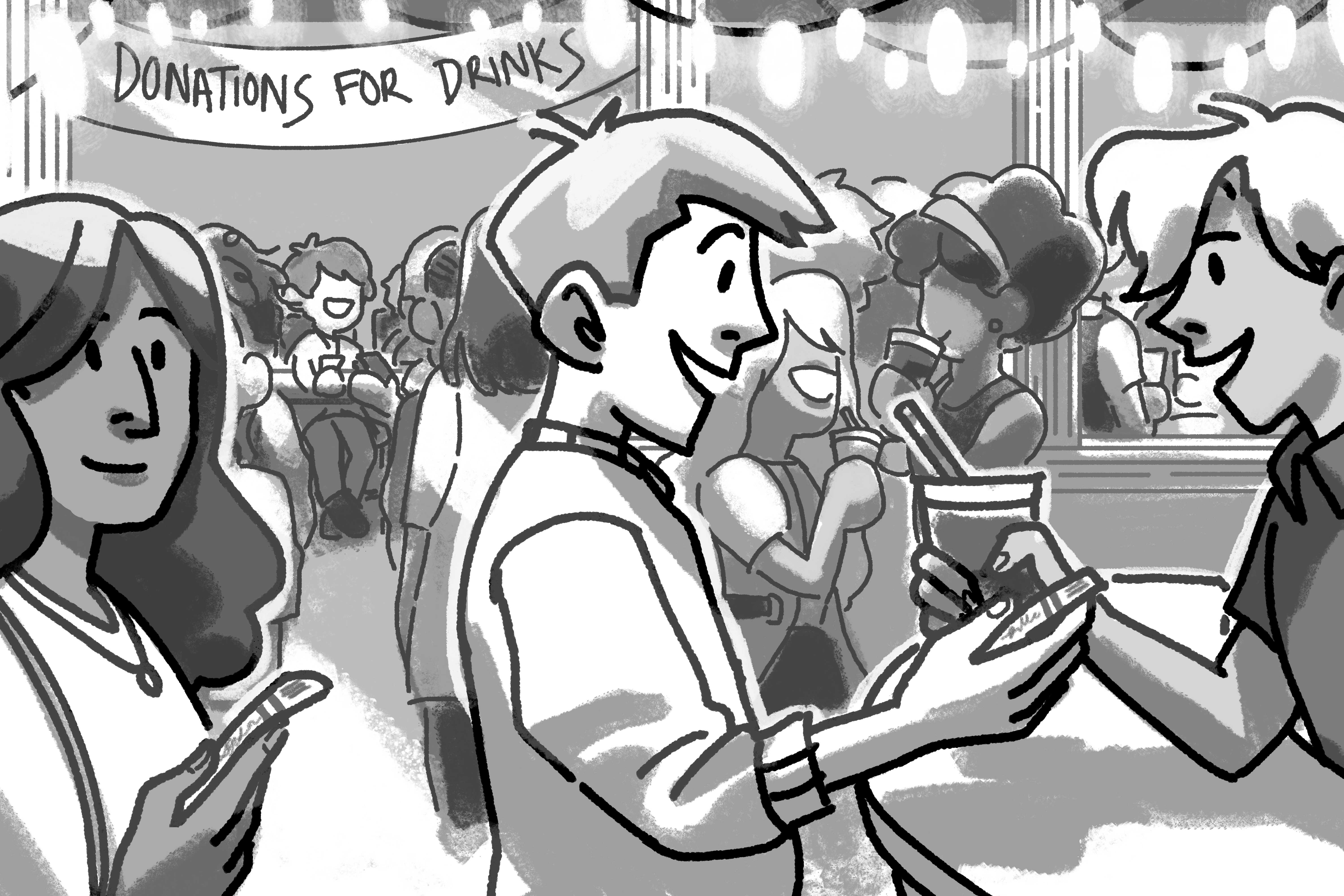As a senior slowly approaching graduation, the month of May feels both a million years away and just around the corner. I am constantly reminded that my time at GW is soon coming to a close from my parents, professors and my calendar as events for the Class of 2019 pop up.
At the end of the first week of this academic year, I headed to Hotel Hive for a senior event with a few friends. The main draw – and the reason my friends and I were really going – was that the first 100 students would receive free drink tickets at the hotel’s rooftop bar. But we knew the real reason behind the event was to draw support for the senior class gift campaign. The event brought seniors together while encouraging graduating students to donate to the University. Students who chose to make a donation at the event were rewarded with an extra drink ticket.

Cartoon by Jeanne Franchesca Dela Cruz
While both of my friends chose not to donate that night, I was incentivized to make a monthly donation to GW. I was happy to support the University, and it also didn’t hurt that an extra margarita was involved. When deciding whether I was ready to make a small, recurring donation, it was easier for me to choose to do so because I am currently employed. But for graduating seniors who are not financially able to donate, it can be embarrassing to attend events that are designed for us but have a goal of securing donations. There is a time and place for senior gift campaigning, but fundraising should not make up the majority of events for seniors. There must be events that are not tied to donations and are strictly focused on bringing the senior class together. Otherwise, the strong connection between senior events and the senior class gift campaign implies that students are just seen as cash cows.
The senior class gift campaign has certainly seen success. Last year, the campaign collected more than $140,000 from the Class of 2018. Those collected funds can be dispersed to numerous scholarships, departments, student organizations and even specific research projects, which is an obvious positive for students and the University.
But it is concerning that so many events for seniors have the ulterior motive of asking students – who have already paid an annual fixed tuition of more than $50,000 per school year – to make further payments to the University before they even finish paying tuition. Across the country, the average student loan debt was $39,400 for the Class of 2017, and that amount is likely to rise due to the trend of climbing tuition and housing costs. While it is great that some students, including myself, are able to make those recurring donations, it leaves a weird taste in my mouth that events like giving out free ice pops come with the caveat of talking about contributing to the senior class gift.
Of course, students who attend these events but don’t want to donate can politely decline to do so. But graduating students shouldn’t feel guilty or like they must avoid events that are specifically for them because they don’t want to or can’t contribute to the senior class gift.
Last year, University President Thomas LeBlanc encouraged the Class of 2018 to continue to donate after graduation in order to leave a legacy. Donating to student organizations or scholarships is definitely one way to leave something for future students, but it is certainly not the only way, and alongside contributing funds, there should be a push to find other ways to give back to GW.
Graduating students who will stay in the DMV area after graduating can offer advice or help student organizations, which can be just as helpful as making financial contributions. I am fortunate to still be close to alumni who were seniors when I was a freshman, and now that I am a senior, I still use them as resources and hope to do the same for current students after I graduate in the spring.
Beyond bringing students together, there can and should be events that are beneficial to the University without the goal of donations. An event that asks graduating seniors for feedback about their time at GW would be a good use of students’ and administrators’ time and would benefit GW more than a small donation will once seniors leave campus.
Senior year is a time full of stress and uncertainty. With thoughts of postgraduate plans and paying off loans, it is off-putting when students are met with donation requests before they’ve even paid their last year of tuition. Senior events should be celebratory, as they are commemorating an important and increasingly expensive life event, but those events shouldn’t just include writing down your credit card information in exchange for a frosty margarita.
Renee Pineda, a senior majoring in political science, is The Hatchet’s opinions editor.
Want to respond to this piece? Submit a letter to the editor.


